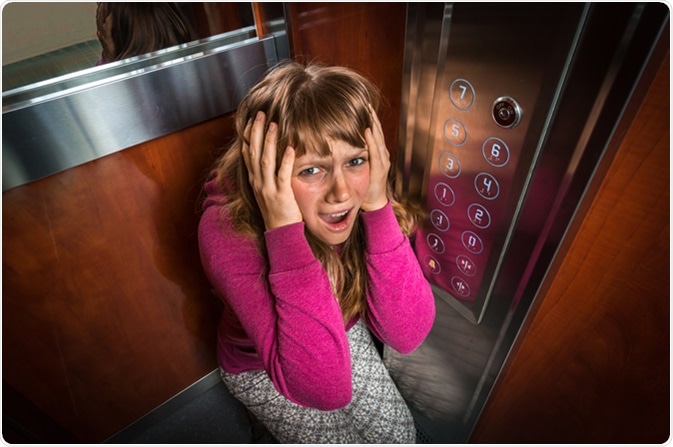Claustrophobia is a fear reaction to small spaces or physical restriction. It is in the category of specific phobia: fear of a specific object or situation. Clinical claustrophobia affects about 4% of the population severely. Many more suffer from claustrophobia at a mild or moderate level. Common triggers for claustrophobia are small rooms, elevators, crowded places, and MRI scanners.

Image Credit: andriano.cz / Shutterstock
Symptoms
Symptoms of claustrophobia fall into the category of symptoms of an anxiety or panic episode. Anxiety is characterized by a physiological stress response. Stress hormones are released into the bloodstream, triggering a “fight or flight” response in the body. Symptoms can be physical or emotional.
Physical symptoms include:
- Shortness of breath: Trouble with breathing due to anxiety is one of the most common symptoms of an anxiety attack. It is usually caused by hyperventilation. Hyperventilation creates a sensation of not getting enough oxygen, but is actually caused by breathing too fast and too deeply. People usually respond by trying to take still deeper breaths, which exacerbates the problem. This can lead to additional symptoms such as lightheadedness, chest pain, weakness in the legs, and rapid heartbeat. This symptom can be alleviated by slow, calm breathing.
- Chest pain: Anxiety due to claustrophobia can cause chest pain, which can be difficult to distinguish from a serious heart problem. Chest pain can be caused by a number of different aspects of anxiety. Hyperventilation can cause chest pain (see above). Chest pain can also be psychosomatic, meaning that the sensation of pain is created by the anxiety.
- Trembling or shaking: An activated fight or flight system floods the body with adrenaline (epinephrine), causing the body to shake or tremble. Deep, slow breathing can help calm trembling. As well, releasing the energy through exercise or yelling can reduce shaking and trembling.
- Lightheadedness: Feeling dizzy or lightheaded during an anxiety episode is usually due to hyperventilation. Calm breathing, exercise, and drinking some water can help with a feeling of lightheadedness.
- Sweating: Sweating is a reaction to hormones released during a fight or flight response. It is a normal and very common response to fear. While sweating can be unpleasant, it is not dangerous. Sweating can’t be stopped directly, but calming activities can reduce the fear response leading to less sweating.
- Nausea: Nausea is caused by a release of adrenaline, disrupting the balance of acids in the stomach. Anxiety can also shut down digestion of food.
Claustrophobia can also create emotional symptoms. Some of those include:
- Depersonalization: This is when the mind feels detached from the self, as if you are not in your own body. Sometimes depersonalization manifests as a sensation of floating and observing your own actions from the outside. It is thought to occur during anxiety attacks as a coping mechanism.
- Overwhelm: During an attack of anxiety triggered by claustrophobia, a person may feel overwhelmed by stress. This can lead parts of the brain to shut down, and alters the production of neurotransmitters and hormones. Overwhelm can make it difficult to think or focus on anything but the fear.
- Irrational thoughts: Like other specific phobias, claustrophobia is a fear that is irrational and disproportionate to the situation. Although there is no actual danger, the psyche reacts as if it is in danger, leading to irrational thoughts about the situation. Irrational thoughts can be dealt with through awareness and thought challenging techniques.
Panic Attack
Claustrophobia can trigger a panic attack. A panic attack is a severe anxiety attack, including many of the same symptoms, but at a greater intensity. Panic attacks usually peak within 10 minutes and then subside.
Sources
- Anxietycentre.com, Anxiety symptoms, http://www.anxietycentre.com/anxiety-symptoms.shtml
- CalmClinic, All Possible Symptoms of Anxiety-The Anxiety Guide, https://www.calmclinic.com/anxiety/signs/irrational-thoughts
- Fears, phobias, and preparedness: toward an evolved module of fear and fear learning, https://www.ncbi.nlm.nih.gov/pubmed/11488376
- Anxietycentre.com, Panic attack symptoms, causes, treatment, statistics, http://www.anxietycentre.com/panic-attack-symptoms.shtml
- Medical Daily, What happens in your brain when you have a panic attack? How the brain’s fear and threat centers backfire, www.medicaldaily.com/what-happens-your-brain-when-you-have-panic-attack-how-brains-fear-and-threat-centers-backfire
Further Reading
Last Updated: Feb 26, 2019